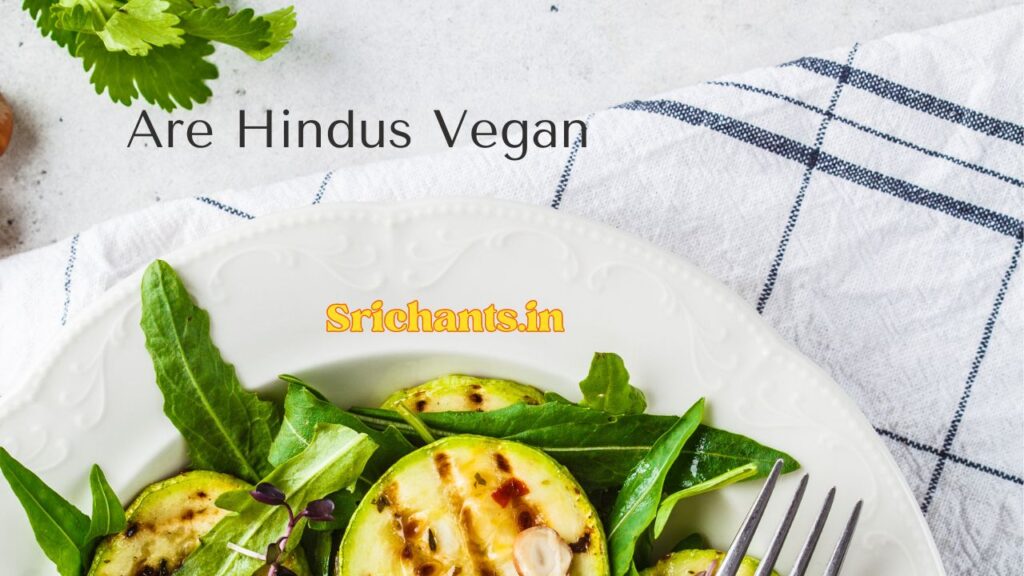Are Hindus Vegan : Vegetarianism and Veganism in Hinduism
Introduction
A significant religion in the world, Hinduism is frequently associated with vegetarianism. The global dissemination of the Hindu vegetarian doctrine has endowed adherents of the faith with a reputation for steadfast vegetarianism. Nevertheless, it is critical to comprehend that Hinduism comprises an extensive spectrum of doctrines and observances, and not every adherent of Hinduism follows a vegetarian dietary regimen. This article aims to examine the spiritual and cultural implications of vegetarianism and veganism within the Hindu faith, drawing upon an analysis of relevant scriptures, historical circumstances, and present-day viewpoints.
Origins of Vegetarianism in Hinduism
Hindus initially ingested flesh and did not strictly adhere to a vegetarian diet. However, with the advancement of human consciousness and comprehension of the cosmos, a progressive transition towards vegetarianism occurred within the religion of Hinduism. The rationale behind this transition was the conviction that adhering to a vegetarian diet is extraordinarily virtuous and harmonious with spiritual endeavors.
Vedas: Encouraging Compassion for All Beings
The Vedas, which are regarded as the preeminent scriptures in Hinduism, comprise verses that preach benevolence towards all living things and proscribe the consumption of flesh. For example, the Atharva Veda (19.48.5) asserts that individuals who engage in yogic practices, meditation, and the protection of all animals demonstrate a sincere commitment to spiritual endeavors. In a similar vein, verse 12.32 of the Yajur Veda emphasizes that it is impermissible to utilize the body bestowed by God for the purpose of destroying His creations.
The notion of vegetarianism in Hinduism predates Buddhism and Jainism, in contrast to prevalent belief. Although Buddhism did contribute to the dissemination of knowledge regarding vegetarianism, the origins of vegetarianism in Hinduism can be traced back thousands of years.
Mahabharata: Bhishma Pitamah’s Teachings
Yudhishthira is advised by Bhishma Pitamah in the epic Mahabharata on the benefits of refraining from the consumption and slaughter of other beings. Individuals who seek attractiveness, perfection, longevity, comprehension, and mental and physical fortitude, he explains, ought to abstain from committing acts of violence. Bhishma Pitamah draws a parallel between the act of discarding honey and flesh and the practice of animal sacrifices, thereby underscoring the criticality of adopting a compassionate diet in lieu of animal products.
Meat abstinence, according to Bhishma Pitamah, is the pinnacle of religious devotion, the pinnacle of penance, and the pinnacle of truth, from which all duty emanates. He emphasizes that abstaining from meat consumption represents the highest refuge of religion, the way to paradise, and contentment.
Hindu Philosophy and Non-Violence (Ahimsa)
Ahimsa, the principle of nonviolence, is a fundamental tenet of Hinduism. Hindus maintain the view that nonviolence ought to be applied to all living things, including animals, in addition to fellow humans. This conviction arises from the recognition that the life-forces of other organisms are equally valuable to them.
Honorable behavior is dictated by the Hindu philosophical principle of Ahimsa. Homo sapiens endeavor to mitigate damage and foster harmony with all sentient entities, perceiving cruelty and violence as impediments to the attainment of spiritual enlightenment and self-actualization.
The Three Gunas and Dietary Choices
Hinduism classifies food into three distinct categories, referred to as the three Gunas, in accordance with the characteristics they possess. Satva (righteousness), Rajas (passion), and Tamas (ignorance) comprise these Gunas.
Satvic Diet: Nourishing the Mind and Body
It is believed that a Satvic diet is optimal for spiritual practices, including yoga and meditation. Primarily comprised of cereals, fresh produce, nuts, seeds, fruits, and vegetables; also includes dairy products. It is believed that satvic foods foster mental clarity, mental purity, and a tranquil state of being. In this regimen, raw vegetables are particularly favored.
Rajasic Diet: Stimulating the Senses
Foods that elicit emotions and stimulate the senses are included in a Rajasic diet. It frequently contains salts, seasonings, and intensely flavored ingredients. Rajasic foods, renowned for their opulent flavors and fragrances, may impede the practice of yoga and meditation and cause distraction.
Tamasic Diet: Heavy and Inert
The Tamasic diet is composed primarily of inert, heavy foods, including cereals and meat. It is purported that these foods promote mental apathy and lethargy. Tamasic foods are forbidden in Hindu scriptures due to their perceived hindrance to the attainment of self-realization and spiritual development.
Regional Variations in Dietary Choices
Although vegetarianism is frequently linked to Hinduism, it is critical to acknowledge that dietary preferences, regional customs, and personal inclinations significantly influence the dietary choices of Hindus.
Certain coastal states, including Kerala and West Bengal, make fish consumption prevalent. Dietary variations across regions are impacted by cultural influences, geographical location, and the accessibility of resources.
Milk and Milk Products in Hinduism
Ghee and other milk-based products occupy a prominent position in Hindu rituals and ceremonies. Ghee, specifically, is regarded as Satvic in the Hindu scriptures. Nevertheless, Ahimsa raises ethical concerns regarding the manner in which cows are treated and the origin of their milk.
In order to uphold the nonviolent principle, it is critical to guarantee that the acquisition of milk and milk products does not result in any adverse effects on livestock. This entails avoiding dairy products produced from cows that have been subjected to mistreatment, confinement in cages, hormone administration, or separation from their offspring.
Vegetarianism, Veganism, and Environmental Responsibility
In Hinduism, vegetarianism and veganism are congruent with the tenets of ecological accountability. In contrast to animal-based diets, plant-based diets use fewer resources, less land, and produce a smaller carbon footprint. Hindus have the capacity to aid in the conservation of natural resources and the preservation of the environment by adopting vegetarian or vegan dietary practices.
Additionally, energy and nutrient utilization efficiency is a factor. It is more efficient to consume plant-based consumables directly from the source (plants) as opposed to animals that have been fed plants, which causes energy and nutrient loss.
Vegetarianism in Other Religions: Islam and Christianity
In contrast to Hinduism, other prominent religions hold divergent viewpoints regarding vegetarianism. Killing for sustenance is permissible in Islam, but it is regarded as a religiously bestowed privilege. Meat may be consumed per the Qur’an, on the condition that it is procured in accordance with Halal principles. The observance of festivals like Eid al-Adha entails the ceremonial execution of animals.
Eating flesh is not expressly forbidden in the Christian faith. The Bible declares that flesh consumption is permissible for humans and that it is possible to consume any living thing. Conversely, Christianity also stresses the significance of refraining from judging others on the basis of their dietary preferences.
Conclusion
Hinduism accords considerable spiritual, ethical, and environmental significance to vegetarianism and veganism. Although vegetarianism is not universally practiced, the guiding principles of Ahimsa (non-violence) and the promotion of compassion towards all living entities remain constant for Hindus. The adherence to vegetarianism is consistent with the pursuit of self-actualization and the conviction that all life is interconnected.
In the ongoing discourse surrounding the dietary practices of Hindus, it is critical to foster consciousness and comprehension regarding the multifarious viewpoints that comprise Hinduism. Hindus have the potential to effect positive change and uphold the profound spiritual legacy of their faith by adopting vegetarianism or veganism, thereby promoting global sustainability and compassion.
It should be acknowledged that the purpose of this article is to present a comprehensive outline of vegetarianism and veganism within the context of Hinduism. Hindus hold diverse cultural beliefs and practices; therefore, respecting personal preferences and cultural diversity within the faith is essential.










